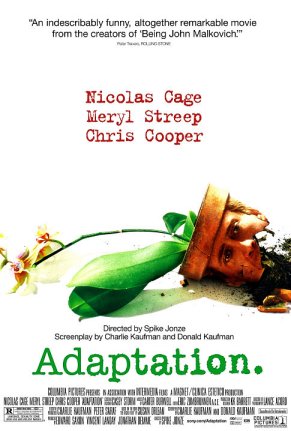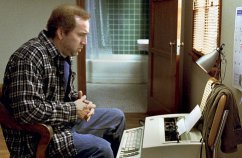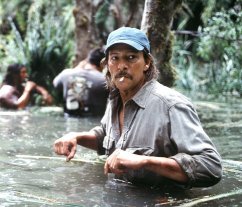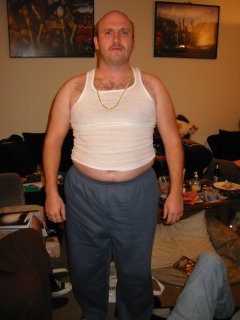Lying on his belly in front of his laptop is internet film critic Jordan Rosa. Shaved head, bare feet, fat. He can't figure out how to interpret Spike Jonze's latest picture, Adaptation, into a review that does the film justice and yet makes a statement of his own. The film at once thrills, bewilders and infuriates. Yet one feels that the script is always in control and every emotion that ripples through the seats (both good and bad) is released with sure intentions.
The picture (written by Charlie Kaufman) concerns screenwriter Charlie Kaufman's (Nicolas Cage) journey through adapting an unadaptable book, Susan Orlean's "The Orchid Thief." Now, I worry that journey isn't the right word. If Kaufman was on a journey this could just be another behind the scenes of the film industry (Charlie hates that term) flick, but like Kaufman and Jonze's last picture, Being John Malkovich, this film also lives to break the rules.
Adaptation comes up against the rules of screenwriting, pulls back the curtain on them, and even while mocking them bows to at least the majesty of them if not their usefulness. When we meet Charlie he is desperately against selling out in his new screenplay. He sweats and obsesses over his thinning hair while explaining that he won't artificially pump a narrative into Orlean's lyrical book about the illegal world of endangered flower smuggling.
He comes home from the meeting to his twin brother Donald (also Cage) who has decided to follow in his brother's footsteps with the help of Robert McKee's book "Story" and his weekend seminar. For Charlie there could be no worse way to go about writing a script than learning limiting rules and then following them, but Donald can't understand or even see Charlie's disdain for aspirations of box office success and fame. As Charlie sees it, McKee is for hacks. I can't help but think of my own copy of "Story" on my own bookshelf and the wisdom I thought I had gleaned from it.
Charlie obsesses about every little thing, both in his script and in his life. Fueled by her picture on the jacket of the book, Orlean (Meryl Streep) becomes the focus of Charlie's masturbatory fantasies as well as his envy. Every emotion from Charlie is equally complex. Excitement can only come when tinged with doubt, confidence only comes with self-hate, and contempt only comes with pity.
In fact all parts of the film come with multiple levels. The obvious meaning of the title Adaptation concerns Charlie's attempt to adapt Orlean's book, but that's only the outermost layer. "The Orchid Thief" muses on the orchid's, and to a greater extent life's, ability to and need to adapt. Meanwhile, the screenplay and therefore the film itself adapts itself to be able to survive as a viable screenplay.
What I realize I have neglected to mention (I'm horrible at synopsizing stories) is that the screenplay Charlie works on is the screenplay he eventually turns in to the studio. Like a video camera pointed at a television screen Adaptation continuously folds in on itself in an endless self-reflexive loop. The picture adapts the ideas of "The Orchid Thief," if not the book itself, while expanding on the themes.
Of course my only knowledge of "The Orchid Thief" comes from the film, but there is really a book called "The Orchid Thief" and there really is a Susan Orlean. For all I know the real book is a bad McBainesque detective thriller and that's part of the joke, but I'm a film writer, not a book reviewer. What I'm failing to explain is odd relationship this picture has with reality. Adaptation was written by Charlie Kaufman (both he and his brother get screen credit). The curious thing is that according to all accounts the real Charlie doesn't have a twin brother named Donald. Not only that, but the seeming protagonist of Orlean's book, John Laroche (Chris Cooper), is obsessed with who will play him in the movie. I say seeming protagonist because from the excerpts we hear from her book, Orlean writes herself into Laroche's story just as Charlie writes himself into hers.
The film itself is an impossible film about adapting an impossible book. Film does action, it doesn't do ideas; but the film is about the ideas of a writer working on a script about ideas. None of it makes sense and that's the beauty of the script. Just as the movie is about grind to a halt along with Charlie's attempts to write the script, this absurd film does the most absurd thing. It sends Charlie Kaufman, the latest champion of anti-traditional screenwriting, to one of Robert McKee's screenwriting seminars. McKee (Brian Cox) is the industry's hottest screenwriting guru. The thing is, McKee really is the industry's hottest screenwriting guru.
The problem I'm finding here comes from the fact that Kaufman has put me, the film reviewer, in the same position he put himself in when he accepted the adaptation assignment. Even as I try to write about his endless self-reflections and self-doubts I am forced into self-reflexive doubt of my own. From Charlie's way of thinking, attending McKee's seminar reeks of desperate selling out. McKee tells Charlie that no matter how bad a film is, as long as it has an interesting ending the audience will love it. Charlie (at least the Cage version or I guess more properly Charlie's version of Charlie) couldn't care less about entertaining an audience.
Charlie's sit down with McKee signals that not only has Charlie sold out but that the film has sold out too.
The film's entire third act is a huge deadpan sell out playing on the worst thriller clichés and everything else Charlie hates. The greatest trick that this film plays will be on the critics themselves. A sure-fire critical success, Adaptation will be praised by the very same critics that loved pictures like The Sixth Sense, which feature nothing but an interesting ending, even while Kaufman points out how hollow films like that are. My only complaint might be that the picture doesn't sell out enough, but maybe that's the beauty. When satire becomes too obvious it becomes parody and Adaptation teeters right on edge.
Is this film a lesson, a message or just a story? Which parts are a goof, and which aren't? I fear I've come up short in my review. Obviously not by the world count, as I've probably gone on too long. I don't know if I've come up short when it comes to my analysis of the film; chances are I have after only one flawed showing. But what I have truly come up short on is that I have sold out in my review. Every hack reviewer will start his or her hack review turning a mirror on the hall of mirrors writing their review in the film's self-reflexive voice.
And I realize now that one can't help but sell out and follow the rules when a deadline looms, or maybe this whole self-reflexive thing was more self-aware than that and I always knew it was the hack move. You tell me what's real. Are you more or less of a hack when you know you are selling out? Donald doesn't know he has sold out, Charlie knows he has. Who's worse?
What it's worth? $9.50









